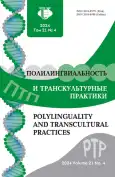Эмоциональная составляющая обучения РКИ иранских учащихся как цель и средство достижения оптимального результата
- Авторы: Резвани В.1, Шульдишова А.А.2
-
Учреждения:
- Университет Альзахра
- Российский университет дружбы народов
- Выпуск: Том 21, № 4 (2024)
- Страницы: 796-809
- Раздел: Арсенал
- URL: https://journal-vniispk.ru/2618-897X/article/view/326902
- DOI: https://doi.org/10.22363/2618-897X-2024-21-4-796-809
- EDN: https://elibrary.ru/ELWAEE
- ID: 326902
Цитировать
Полный текст
Аннотация
Анализируются приёмы мотивации обучения русскому языку иранских студентов; представлены методические подходы к использованию их в технологии обучения. Рассмотрены активные способы обучения, их особенности, эффективность для повышения качества освоения изучаемого предмета с учётом мнений западных и российских ученых-педагогов. В соответствии с поставленной задачей исследование опирается на результаты, полученные в опросе, касающемся оценок и мнений об «эмоциональных» методах воздействия на процесс освоения языка. Это инклюзивное понятие относится ко всем педагогическим методам, касающимся эмоций учащихся. В опросе приняли участие 114 студентов бакалавриата по русскому языку в иранских государственных университетах. Анкетирование проведено в условиях пандемии COVID-19 и ориентировано, во-первых, на определение предпочтений, отдаваемых студентами при выборе очной или дистанционной формы обучения, во-вторых, на оценку игровых технологий (Role-playing), просмотра фильмов, ведения дискуссий, постановку спектаклей студентами, в-третьих, на оценку целесообразности использования социальных сетей и обучающих программ, а также применения интерактивно-гибридного метода обучения. По результатам опросов, 85,9 % студентов выразили недовольство процессом виртуального обучения. 53 % положительно оценили сочетанное применение вышеназванных методов.
Ключевые слова
Об авторах
Ваджихе Резвани
Университет Альзахра
Email: v.rezvani@alzahra.ac.ir
ORCID iD: 0000-0002-5630-6178
кандидат филологических наук, старший преподаватель, заведующий кафедрой русского языка, факультет литературы
Исламская Республика Иран, 1993893973, г. Тегеран, ул. Шейх-Бахаи, Дэх-э-ВанакАлина Анатольевна Шульдишова
Российский университет дружбы народов
Автор, ответственный за переписку.
Email: shuldishova_aa@pfur.ru
ORCID iD: 0000-0002-9603-8411
SPIN-код: 6181-7348
Scopus Author ID: 1026530
кандидат филологических наук, доцент кафедры русского языка № 5, институт русского языка
Российская Федерация, 117198, г. Москва, ул. Миклухо-Маклая, 6Список литературы
- Balykhina, T.M. 2007. Methods of Teaching Russian as a Non-native, New Language. Moscow: RUDN Publ., 185 p. Print. (In Russ.)
- Kudryavtsev, V.T. 2010. “Freedom to learn: K. Rogers goes towards V.V. Davydov (contours of a new philosophy of education).ˮ Psychology and education, no 4, pp. 51–60. Print. (In Russ.)
- Pechnikov, A.N. 1996. “Features of educational motivation of cadets of law schools of the Ministry of Internal Affairs.ˮ Psychology: results and prospects: Abstracts of the scientific and practical conference. St. Petersburg, Print. (In Russ.)
- Richards, J.C., and T.S. Rodgers. 2010. Approaches and Methods in Language Teaching. Cambridge University Press.
- Sehran, D. 2020. “Students’ Opinions about the Distance Education to Art and Design Courses in the Pandemic Process.” World Journal of Education, vol. 10, no 3, p.113
- Klyachko, T.L., Novoseltsev A.V., Odoevskaya E.V., and S.G. Sinelnikov-Murylev. 2022. “Lessons Learned from the Coronavirus Pandemic and Possible Changes to Funding Mechanisms in Higher Education.” Educational Studies, no 1, pp. 8–30.
- Maly, Yu.M. 2018. Game technologies in the process of teaching a foreign language. Modern problems of philology and methods of teaching languages: questions of theory and practice. Kazan (Volga Region) Federal University, pp. 124–126. Print. (In Russ.)
- Habib, S. 2018. A Critique of Yalom’s Works. Nashre Ney.
- Lee, S.L. 2015. “Revisit Role-Playing Activities in Foreign Language Teaching and Learning: Remodeling Learners’ Cultural Identity.” Electronic Journal of Foreign Language Teaching, vol. 12, suppl. 1, pp. 346–359.
- Palfreyman, D. 2003. “Introduction: Culture and learner autonomy.” In D. Palfreyman & R.C. Smith (Eds.). Learner autonomy across cultures: Language education perspectives, pp. 1–19. Basingstoke. Palgrave Macmillan.
- Benson, P. 2011. Teaching and researching autonomy in language learning. Harlow: Longman.
- Borozdina, N.A. 2019. “Presentations, electronic portfolios and blogfolios in foreign language education: methodological principles and criteria of effectiveness, Innovative technologies of teaching a foreign language in higher education and school: implementation of modern Federal State Educational Standards.” In Collection of scientific papers based on the materials of the Fourth International Scientific and Practical Conference. Voronezh, pp.19–24. Print. (In Russ.)
- Arkhipova, T.L. Osipova N.V., and M.S. Lvov. 2015. “Social networks as a means of organizing the educational process.” Information Technologies in Education, no. 22, pp. 7–18. Print. (In Russ.)
Дополнительные файлы









